Digger talks with
Richard Lawson at RL Music - Europe's largest Vintage Analogue
Synthesizer dealer
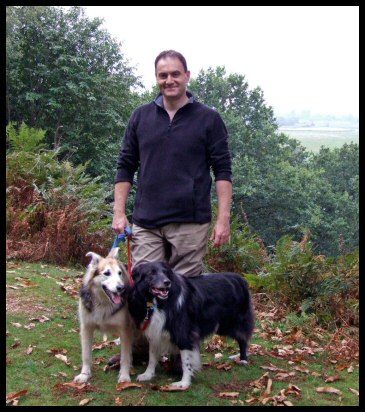
Digger: Can you tell us why you have a passion for analogue
synthesizers?
Richard: It started when I was In my mid to late teens and at
school in the mid-70s. My best friend and I were listening to
a lot of people at that time like; Wendy Carlos, Tomita, JMJ and all
the prog-rock bands and other super groups, like Pink Floyd, the Who
and The Beatles. We could hear these people were using electronic
instruments, some in a really big way. It kind of blew us away
really because of how these things sounded. But, being at school,
weíd no money and no possibility of owning any of this stuff so
weíd just spend hours listening to records and reading about
synths and visiting shops playing the demo units. At that time my
friend and I (who are now business partners), just played pianos and
electronic organs at home and just dreamed about owning some of this
gear and that went through from the 70s to today although our
collection of instruments has improved slightly these days. Thatís
where the passion all started I think and a lot of people who are
into electronic music would tell you much the same thing. It was the
bands and what they were using and the images we saw of what they
were playing on Top Of The Pops.
Digger: Were you classically trained?
Richard: No, not at all. Even today Iíve never had any formal
training, but I think with electronic music you can get away with
that. Iím not saying the equipment plays itself, but unlike a
classical piano or orchestral instruments you donít need to be
formally trained in order to get some sounds out of them. So maybe
thatís a lazy manís way of getting into music without being a
maestro.
Digger: Or do what I did and play the drums.
Richard: (Laughs) You donít have to play a note then.
Digger: I think technically speaking they are notes, but thereís
that old joke about ďWhat do you call a guy who hangs around with
musicians?Ē And the answer, of course, is a drummer.
Richard: I donít know whether itís a difficult job or not.
Digger: If itís done well itís incredibly difficult and just as
technical as any other instrument, but not the way I play it
thatís for sure!
Richard: The skill is making it look easy. So with synthesizers I
think that all this mix of technology at the time and the unusual
nature of the instruments, it hit something in my psyche.
Digger: And you liked the lights and the buttons?!
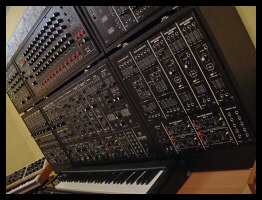
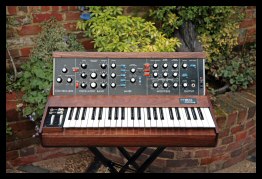
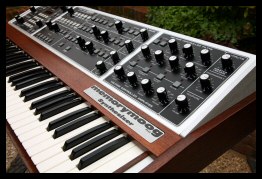
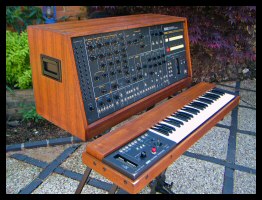
Richard: Yes, and making sounds that annoyed the neighbours which
was great. Most of my customers today are a similar age as well, so
the influences must have been pretty heavy in those days.
Digger: Did you have the choice of headphones?
Richard: No, because the synths we could afford were all mono
back then, so unless you put them through your mum and dadís
speakers in the family radiogram then you wouldnít be able to hear
them that well. We did get through a lot of speakers in those days
as well when we got our first synths. Weíd destroy them - rip the
paper cones apart..he he.
Digger: Are you a fan of Spinal Tap?
Richard: Not hugely. Itís all great stuff but if youíre a
prog rock fan then youíll be listening to people like Rick Wakeman
playing a mini-Moog and youíll want that big keyboard rack on
stage, which is great. Other people like the modular studio-based
stuff like Wendy Carlos used. It depends entirely on your budget.
Digger: Whatís the difference between analogue and digital when it
comes to synths?
Richard: Thatís okay for me to answer because Iím not
technical so I can probably explain it easier. The main technology
difference is that analogue instruments are using technology that
was developed up to the 1970s, which use discreet components like
resistors and capacitors.
Digger: Things that move or have two states?
Richard: Yes, theyíre basically switches which are governed and
controlled by voltages. In music terms, it means that they werenít
mass-produced, but for the most part hand-built in small numbers,
often in peopleís sheds or garages up until the late 70s. Apart
from the big Japanese manufacturers, that is. Even the circuit
boards were hand drawn, so when you see them they have wiggly lines
and are nothing like the modern technology. So what does that do to
the music? It means that all the tolerances and all the components
that fit within that are all done with such a wide scope of
variation that you get a certain amount of imperfection in the
design. So, I think an analogy would be comparing a car that was
built in the 1950s to one that was built this year. Youíll see
something that rattles and wanders along the road but people will
say ďYeah, but itís got character.Ē How do you define that?
Itís very subjective, but it is a bit like art and how do you
define something thatís beautiful? I think in musicianís terms,
for an audiophile or for someone who just appreciates listening to
music you will tell the difference between something which is
hand-built as opposed to a modern device. Digital, of course, is the
extreme end Ė it started in the late 70s and early 80s, in fact,
but in terms of todayís music everything today is mass-produced
and to fabulous tolerances and is mainly software-driven using
computer components.
Digger: Zeroes and ones.
Richard: Yes, zeroes and ones and itís pretty much perfect, but
to the human ear, as organic beings, we actually look for and listen
for imperfections in things which sound better to us. Iím
sure this subject has been written about in many a scientific
journal.
Digger: An irony is that when you listen to a digitally-remastered
version of an original analogue recording then you hear more of the
imperfections than you ever would on the original Ďpressingí.
Richard: Itís bizarre. Itís also connected with this renaissance
of people playing vinyl records again. A lot of recording studios
have now gone back to using analogue tape recording systems again
and have gone away from digital. Some studios may record some
aspects of the final recording onto a tape and then master it again
back onto digital Ė Ďbouncing it backí, which will add
something not perfect to the recording. So digital is clean, itís
perfect, itís fantastic and Iím not anti-digital at all. At my
own studio my own keyboards, and what we do, uses a very high
percentage of modern equipment. But, analogue or digital in itself -
no, it has to be a marriage of the two which makes it work.
Digger: When they used the drum synthesizers in the 80s they were
clinical and often overused. It sounded unnatural.
Richard: Funnily enough, you can now get everything that was ever
produced in terms of drum machines onto just one CD! They play it
with a sequencer on a computer now, but people still want to buy the
old drum machines because theyíll tell you itís more creative
standing there pressing buttons than doing it on a mouse. Work that
one out, because itís a fraction of the price to do it on a
computer but thereís something about the tactile experience of
using an original piece of equipment. Which is why people are into
analogue, I guess.
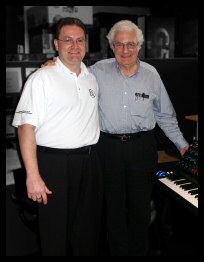
Richard
with Robert Moog
Digger: You met Robert Moog. When was that and can you describe the
encounter?
Richard: Phew, yeah! That was amazing. I hero-worship the man and
Robert was considered the grandfather of synthesis Ė some people
may contend that as there were other great engineers around in his
early days. But heís had the most influence on electronic music
since it began in the late 60s early 70s. And me being a child of
the 60s and growing up in the 70s with the instruments it was Moog.
Itís always been Moog. We always wanted the mini-Moog or a Moog
modular and everything we listened to we thought was made or built
or designed around a Moog. Of course that wasnít necessarily true,
but for me meeting him was very important and I was a little bit
nervous that day. It was almost too important. We were talking in
the interview I did with him about his comfort zone which is about
design engineering, instruments and musicians and he was brilliant.
He used to listen to musicians and his products were designed with
them in mind. The day was about that and the interview with him,
although the whole day was a visit to London at Turnkey where he was
promoting The Voyager. The whole day was hosted by Turnkey and in
the evening there was a concert in one of the local pubs using
Theremin and Voyagers and the guy heading up the band was the
ex-keyboard player of The Buggles. It was just great. Then Bob did a
speech and everyone was bringing their Moogs in from their cars and
getting him to sign them. Amazing. I got a great picture of me and
Bob and itís something I never will forget and Iím glad I did
it. What an experience.
Digger: Fantastic. You mentioned the Theremin there. Have you seen
Bill Baileyís orchestra DVD because he plays it on that?
Richard: I have and itís a damned hard instrument to play and
maybe as difficult as a violin. Itís all about hand positions and
I did meet a few people whoíve had lessons with a French
professional and she was teaching people but it would take ten years
for you to be able to stand and perform music on it without it
sounding like something from The Forbidden Planet! When we saw the
concert it was really good because it had something quite haunting.
Digger: You mentioned The Buggles. Have you bumped into Trevor
Horne?
Richard: No, I wish I had. He was a huge influence and when they
came out it was very much electronic music. Him and most of the
people of that era. People like Howard Jones.
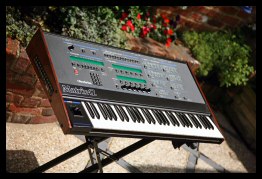
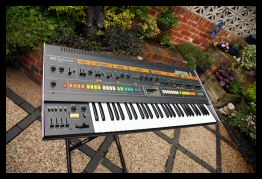
Digger: They claimed that Chicory Tip had the first UK hit using a
synth.
Richard: A lot of those guys were using sampling back then as
well.
Digger: I was listening to some contemporary music at the weekend
and three of the songs were sampling older songs from the 60s and
70s.
Richard: Big artists and film score writers are integrating all
of this technology into their new music because a lot of the use of
classical music is alongside the raw powerful sound of analogue
because it gives a contrast. Most of my customers now are
professional people and using this equipment in current projects.
Digger: Who have been and who are the biggest exponents of analogue
synths?
Richard: Thereís a book there! Without going into too much
detail, depending on how far back you go and what sort of genre of
music it is you listen to, designers would have been the big
American designers back in the late 70s Ė users would have been
Wendy Carlos and Jean-Michel Jarre and people like Tangerine Dream
They were major adopters of that technology and made massively
successful careers out of instrumental music. I remember back in the
70s and 80s instrumental music was seen as elevator music. Nobody
would buy it, but these guys changed everyoneís opinions of it.
Exponents like Howard Jones and Vince Clark and Gary Newman Ė all
of them synth gurus and they changed peopleís perceptions and that
synths could sound really cool. And a lot of people locked into that
and kept the whole dream alive. Things changed and this stuff was
expensive and maybe difficult to tour with and when the digital
stuff came along from the Japanese houses like Korg, Yamaha, Roland
and so on, so then music changed. The way people used it changed.
But todayís users of analogue synths are the big supergroups
again, but not so obviously. You wonít have a modern supergroup on
stage banging away at a 1970s modular anymore, but you will have
people like The Chemical Brothers of Aphex Twin using big modular
systems on stage and touring with them. Hybrids and pure analogues,
which is amazing because itís not the easiest to use on tour.
Digger: How difficult is it to get parts for servicing?
Richard: Very hard. One of the values of the business that I
operate is the network of people around the world that can help us
do it. Itís taken many years to build a network of suppliers and
specialist parts manufacturers, but most of these parts are now 30
years out of production. So if youíre looking to get spares for
something that was made in 1982 then nobody makes them anymore you
either have to go to a bad condition unit and break it up for
spares, which still costs a fortune because theyíre still
valuable, or you have to find creative ways to either re-manufacture
them or find work-arounds. Every single repair and restoration
takes a lot of resources and a lot of money to get them right.
Digger: And one less box to be available for the future as well.
Richard: Yes, most of the vintage of stuff weíre seeing from
the private market is the dregs. They couldnít sell it the first
time around, stuck it under the bed and brought it out and dusted it
off and are now asking lots of money for stuff that is broken.
Thatís the best youíre going to get and it is a diminishing
market in that respect. But there is a lot of good equipment out
there, not least because my business and many other companies like
us around the world, have done the restoration on them and people
who now understand the value of them. There is a definition of what
vintage is Ė analogue synths are still made today Ė vintage
synths which were made 30 or so years ago are not made now but the
spirit of their design can be incorporated into modern products.
Vintage is the best of its day, so, for example, a vintage Fender
guitar sounds better and is worth a lot more than one that was made
yesterday. Why would you buy a vintage one for £60,000 when you
could buy a new one for a few hundred? Thereís something intrinsic
in the original article that makes it valuable.
Digger: What advice would you give to new bands who want to get into
analogue synths?
Richard: The biggest problem with the vintage stuff is the price
and most new bands starting up are not going to have the financial
resources to go out and spend thousands on a synth when they can
probably kit out the whole band for that. There are a number of
options. If you want the purity of the analogue sound and the
rawness and flexibility that analogue can give you then there are
literally dozens of companies around the world making analogue
instruments in various shapes, sizes and capacities. If anybodyís
interested in finding out who they are then there are various
resources on the Internet or theyíre welcome to contact me for
pointers. Some of these are modest entry-level prices, the same as
youíd pay for a digital keyboard. And thatís good news.
Thereís an analogue music tech renaissance going on. Theyíre
made of discreet components and have gone back to that old-school
philosophy of design and thatís how they get the old-school sound.
Thereís some companies using modern techniques but still making
their systems from pseudo-analogue but using modern production
techniques. These are relatively cheap and you can buy analogue
synths within a few hundred pounds. It does the job. If you wanted
the great names of the 60s, 70s and 80s youíre probably going to
have to buy an original keyboard from that time which is going to be
lots of money because of the demand and lack of supply.
Digger: Whatís lots of money?
Richard: Depends what it is. If itís Moog modulars you can be
talking between £20-£50,000. If itís something like a Sequential
Pro One or a Moog Prodigy, youíre talking around £600 to £1000
mark. Theyíre very worthwhile machines so itís a question of
budget. The people who spend money on the big systems tend to be the
big professional users. They can probably justify that spend because
theyíll be using it on lots of projects. To buy it as an objet
díart to stick in your room and look at occasionally is probably
not the way to go although if you can afford it then go for it as
itís also a good investment.
Digger: I suppose there are a few mega-rich collectors around?
Richard: Exactly. There are some of those people out there as well
but they certainly donít represent the majority at all.
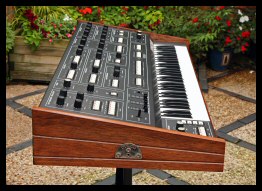
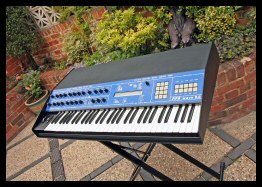
Digger: Whereís the business heading?
Richard: The business that weíre in is in ever decreasing
circles as I mentioned earlier because thereís a limited supply of
the technology. What we do is keep investing more into perfecting
the restorations so we can restore to the highest level. Our
reputation around the world is based on delivery of the best quality
and we want to keep that focus. Where does it go from there? I
donít really know. Every year people say to us that analogueís
dying and thereís nothing left but we seem to keep finding all
sorts of opportunities which counter that opinion. But weíd like
to keep the high quality rather than box-shifting low-end stuff
because most of our customers are discerning people who want the
best possible quality, accepting that this gear is old and can be
difficult to maintain. Business as usual, and itís getting harder,
but we enjoy what we do because weíre passionate about it. If we
did it just for the money we wouldnít do it. Weíve made various
additions to the business where weíve brought in partners who can
sell their products because we feel it fits or business philosophy.
Macbeth Studio Systems, for example, produce very specialised
hand-built modular systems and modules which are just extraordinary,
based all around the early analogue designs and about as
vintage-sounding as you can get. Theyíre unique, high-quality and
very affordable products and we like to involve ourselves in those
sorts of partnerships. That adds to the flavour of the business. But
the vintage is where it all started and where weíd really like to
keep it.
Digger: It sounds as though youíre another one of these people who
has turned their passion into a going concern and a very storing
one?
Richard: Itís better than a real job! Over the next few years
weíre going to use the technology to do writing and producing of
our own music as well. Thatís another thrust of the business,
using the technology with modern digital stuff as well to produce
sounds and new tracks and something slightly different.
Digger: The youthful imperative to write and create music is just as
strong as it ever was.
Richard: If anything itís got stronger, because what you can
buy now for the money compared to what it was costing 20 or 30 years
ago, you can get an awful lot more. You can buy an analogue synth
these days and plug it into your laptop and itís 1,000 times more
powerful than anything available in those days. The ability for a
young person sitting in their bedroom trying to write a track. You
can write a hit-making piece of music now without even venturing
outside your house. You donít even need to be a rich person. The
marriage of analogue and digital has never been better.
Digger: God bless the Internet.
Richard: Isnít it good? The market I have is truly global and
most of the customers I have through RL Music are not in the UK
at all.
Digger: Imagine trying to do this with 60s technology, running an
international company?
Richard: I donít think it would be possible. I remember back in
the 70s and early 80s weíd go to the back-street music shops in
London to fiddle around with the keyboards on display. But that kind
of business model is unworkable now, to run a shop with all the
overheads with specialised equipment, youíd be out of business in
three months.
Digger: Iíve seen that with movie memorabilia. Iíd often spend a
day in London at the memorabilia shops whiling away many a happy
hour. All of those shops have gone now, because of The Internet.
Richard: Turnkey was probably the last big music retailer in
London and they went bust about two years ago. Digital Village, and
Dawsonís are still high-street retailers, but theyíre kind of
mainstream music shops. I often get emails from Americans coming
over to visit the UK and they want to come to our store and visit
all the vintage synth shops. I have to disappoint them - we donít
have a physical outlet and there arenít any vintage synth shops
out there.
Digger: Thereís not even one in Denmark Street.
Richard: No, I think Argentís are still there, selling sheet
music and that really seems to be the way to go. Thereís been a
massive interest in guitars in the past couple of years and
thereís a whole retro thing going on. Thereís always a global
passion with old, be it jukeboxes, valve based tech etc.
Digger: Thereís a company selling brick mobile phones again now.
Itís a good thing to be seen with again!
Richard: Is there? I had one when I was a salesman in the 80s.
Here we are in 2010 and the technology has just got so big. I was
talking to my wife about this. We both have Mac books, iPhones, LCD
TV, Apple TV, Blue ray and Play station and the Wii and a B&O
stereo system and thatís just my lounge! This is just an average
household!
Digger: Richard, itís been great taking to you and long may your
business flourish.
Richard: Thank you Digger and all the best to you as well.
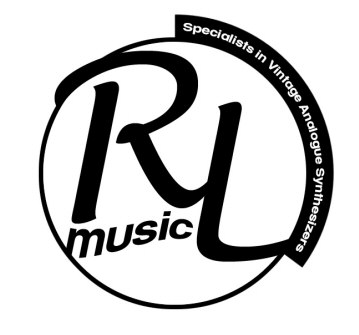
www.rlmusic.co.uk
| RL
Music - Europe's largest Vintage Analogue Synthesizer dealer |
Website |
RL
Music |
Details |
We are a specialist
business based in Reading, Berkshire in the south of
England, offering a personal one-to-one service for
people looking to buy rare and beautiful vintage
analogue music machines.
We are passionate about Vintage Analogue Synthesizers
and work hard to ensure you are satisfied with your
purchase. We also want you to buy from us again and
recommend us to your friends if you are pleased
with our service and products.
We specialise in the rare and hard to find
synthesizers that are highly collectable and usable in
today's home & professional studios.
Call Richard on :
+44 (0)118 947 2474
+44 (0)798 647 0853
rlmusic@btopenworld.com |
|